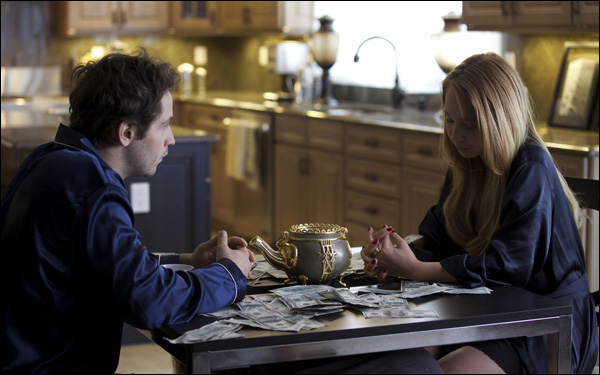Within seconds of sitting down across from her, Ramaa Mosley presented me with a crisp $100 bill, an initially happy surprise since we had only just met followed by the disappointment that it was a fake to promote her film. Still, that didn’t sway my initial impression of the newly minted feature filmmaker as someone intent on spreading happiness, even if it hurts a little bit in the process.
The lead characters in Mosley’s directorial debut “The Brass Teapot” have to learn this lesson the hard way, though when the dark comedy opens, things don’t seem like they could get much worse. Happily married but struggling to get by, John (Michael Angarano) has been laid off from his telemarketing job and Alice (Juno Temple) scans the classifieds to put her art history degree to use without much luck.
That all seems to change when in advance of an appearance on Antiques Roadshow, the two acquire the film’s titular item from a mysterious old woman, soon discovering it has the magical ability to spit out dollar bills up into the hundreds when its owners suffer physical pain. Alice is more than happy to note, “people kill themselves” to get ahead at work, so it makes sense (and cents) to start booking root canals and Brazilian waxes until the couple learns of the real trouble they could be in if the kettle isn’t returned to its rightful home.
Yet in Mosley’s hands, the magic of “The Brass Teapot” isn’t limited to the couple who possesses it, but extends through the entirety of her highly amusing and cheekily mischievous dark comedy that lightens up the mood of these precarious economic times. A day after the film’s successful premiere at the Toronto Film Festival, Mosley stole my attention away from the (faux) Benjamin she handed me – something she clearly has a knack for – to talk about the sprawling creation of her first movie, balancing the reality of tough times with a fun fairy tale-esque story, and the enjoyment of quite literally torturing her central characters.
How did this film come about?
I read a short story online called “The Brass Teapot” written by Tim Macy. I fell in love with it, and I contacted him. He was this 28-year-old living in Kansas City and we just began a dialogue about what this could be. We actually started by making it into a comic book and then developed it into a screenplay.
What was it about the idea that you really connected with?
We were just at the forefront of hitting that economic downturn and realizing that jobs were scarce. There’s a whole generation of kids coming out of college that can’t find work, yet everyone thinks they need to have new shoes and a nice car. So what do you do? The concept of a magical teapot that can give you money for pain was really attractive because people work a nine-to-five job that can be torturous if you don’t love it, so the teapot became a metaphor for our desire for more money, our desire for things and what we’re willing to do, how far we’re willing to go to achieve that.
The great balance you strike in this is between making this timely in the way it’s grounded in a relatable reality while being fantastical enough to be timeless. Was the temptation there to create a more specific context?
I grew up on movies like “Witches of Eastwick” and “Splash” and “E.T.,” so the movies that I love are movies in which average people experience something extraordinary. For me, it seemed perfectly natural to be able to be freed up of any idea of reality and to place the audience in a context in which they could believe it and they could fall in love with the characters. Because the center of the story is John and Alice, you need to love them in order to go on the journey with them, but then to allow the audience to completely immerse themselves and buy into this idea of a magical teapot.
You may have already answered it, but how did you get interested in filmmaking?
The first movie that I actually am conscious of seeing and remembering is “Close Encounters.” Seeing that with my family, I was struck that something really important and big had happened. And again, that actually is a great example of a story about an average person who experiences something supernatural and extraordinary that changes him forever. That was the beginning of loving movies.
Then growing up, we watched a lot of James Bond and John Wayne movies, so I was really into action films and then seguewayed into Spielberg and Ron Howard and I think around 14 years old was when I decided I wanted to direct movies. Right about the time I was 15, I directed a documentary about environmental problems and how they affect children. When I sat in the audience and watched the way people responded to the film, it was so impactful, I knew that was the moment I wanted to dedicate my life to making movies. I really thought by the time I was 21, I would have an Oscar. [laughs]
It’s funny you started in documentaries since I noticed there are videos online about the teapot’s mythology that are filmed in a documentary style. Did you ever think about a different approach to this film?
We did make a documentary called “The Legend of the Brass Teapot” that was filmed all around the world with experts from Biblical scholars to the writer of “The Legend of the Brass Teapot.” Throughout time, there’s been artifacts like the Arc of the Covenant, the Spear of Destiny, and the Holy Grail that people have been mesmerized by and believe in. I chose to take that public interest in these magical objects and use that to our benefit. And having come from advertising because I direct commercials, I knew that because we have a limited budget, we needed to do something to spark people’s imagination, so that’s really why we began by talking about the legend of the teapot and its history.
Did you have a lot of fun figuring out ways to torture these people?
Yes! [laughs] I knew tonally I didn’t want the movie to be too dark and definitely didn’t want it to be horror. We wanted it to be funny, so it was really important to me that the little things that they do to hurt themselves bring humor. What I loved is in the audience for the [premiere] yesterday, when Alice goes to get the Brazilian bikini wax and then when John goes to the dentist, you heard a resounding yes [from the audience]! Because those are the things that we would all think about doing, I think the audience really responded to that. So it was fun coming up with those little ideas.
What was the premiere like for you? You said beforehand you wanted to shake every person’s hand in the ticket line for attending.
It was a magical moment I will never forget. It was truly a dream come true and it was especially amazing to have my first premiere be at TIFF with such a warm audience. I didn’t know what to expect, but the way that the audience responded and laughed and clapped, I was so moved. I really felt that it was so special.
“The Brass Teapot” does not yet have U.S. distribution. It plays the Toronto Film Festival once more on September 14th at the Bloor Hot Docs Cinema.




